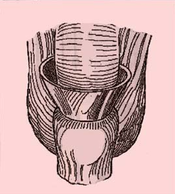Difference between revisions of "Judaeus Pondum"
WikiModEn2 (talk | contribs) m |
m (wikify skin) |
||
| (2 intermediate revisions by the same user not shown) | |||
| Line 8: | Line 8: | ||
The '''Judaeus Pondum''' was a device used during the later Roman occupation of Judea. Its roman name may be translated as either the "Jewish Weight" or the "Jewish Burden". None are known to still exist and contemporary descriptions of them are rather vague. We know the body of the device was a heavy copper or bronze tube that perhaps was attached to the remaining [[foreskin]] with a leather thong, or it may simply have been fitted tightly enough that, when the penis was inserted into the tube, the tube was unable to slide off. In any case, the weight of the tube acted as a source of tension to stimulate [[tissue expansion]] and the growth of new foreskin tissue. | The '''Judaeus Pondum''' was a device used during the later Roman occupation of Judea. Its roman name may be translated as either the "Jewish Weight" or the "Jewish Burden". None are known to still exist and contemporary descriptions of them are rather vague. We know the body of the device was a heavy copper or bronze tube that perhaps was attached to the remaining [[foreskin]] with a leather thong, or it may simply have been fitted tightly enough that, when the penis was inserted into the tube, the tube was unable to slide off. In any case, the weight of the tube acted as a source of tension to stimulate [[tissue expansion]] and the growth of new foreskin tissue. | ||
| − | A similar device was previously described by Galen, a round object in the form of a little lead spout. The skin of the posthe would be stretched over the exterior of this spout and secured with a soft leather cord. | + | A similar device was previously described by Galen, a round object in the form of a little lead spout. The [[skin]] of the posthe would be stretched over the exterior of this spout and secured with a soft leather cord. |
[[Foreskin restoration]] was evidently common enough for those who underwent it to have a name, ''epispastikós'' ("stretched one") in Greece and ''recutitio'' ("re-skinned") in Rome. | [[Foreskin restoration]] was evidently common enough for those who underwent it to have a name, ''epispastikós'' ("stretched one") in Greece and ''recutitio'' ("re-skinned") in Rome. | ||
{{SEEALSO}} | {{SEEALSO}} | ||
| − | |||
* [[Basics of foreskin restoration]] | * [[Basics of foreskin restoration]] | ||
* [[Foreskin restoration]] | * [[Foreskin restoration]] | ||
* [[Surgical foreskin restoration]] | * [[Surgical foreskin restoration]] | ||
| − | * [[Category: | + | * [[:Category:Film about foreskin restoration]] |
* [[Literature about foreskin restoration]] | * [[Literature about foreskin restoration]] | ||
| − | |||
{{LINKS}} | {{LINKS}} | ||
| Line 27: | Line 25: | ||
{{REF}} | {{REF}} | ||
| − | [[Category:Foreskin restoration | + | [[Category:Foreskin restoration device]] |
[[Category:From IntactWiki]] | [[Category:From IntactWiki]] | ||
Latest revision as of 16:58, 27 December 2021

|
| Judaeus pondum |
The Judaeus Pondum was a device used during the later Roman occupation of Judea. Its roman name may be translated as either the "Jewish Weight" or the "Jewish Burden". None are known to still exist and contemporary descriptions of them are rather vague. We know the body of the device was a heavy copper or bronze tube that perhaps was attached to the remaining foreskin with a leather thong, or it may simply have been fitted tightly enough that, when the penis was inserted into the tube, the tube was unable to slide off. In any case, the weight of the tube acted as a source of tension to stimulate tissue expansion and the growth of new foreskin tissue.
A similar device was previously described by Galen, a round object in the form of a little lead spout. The skin of the posthe would be stretched over the exterior of this spout and secured with a soft leather cord.
Foreskin restoration was evidently common enough for those who underwent it to have a name, epispastikós ("stretched one") in Greece and recutitio ("re-skinned") in Rome.
See also
- Basics of foreskin restoration
- Foreskin restoration
- Surgical foreskin restoration
- Category:Film about foreskin restoration
- Literature about foreskin restoration
External links
References